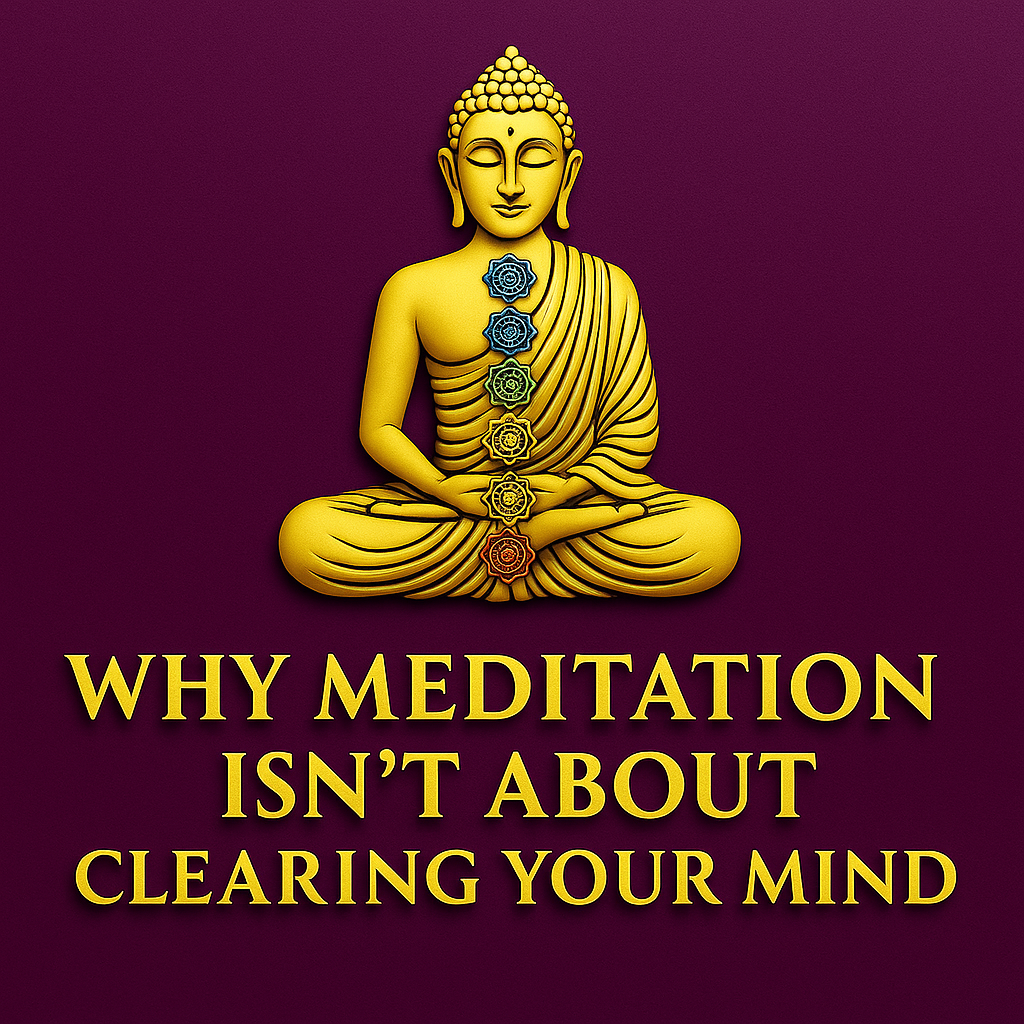
Why Meditation Isn’t About Clearing Your Mind (And What It Is About Instead)
Share
For seekers of calm, clarity and something real
“I just can’t switch my mind off.”
Sound familiar? It’s one of the most common things people say when they talk about meditation. You sit down, close your eyes and boom—your brain starts narrating your entire to-do list, your ex’s latest Instagram post and that weird thing you said in 2014. Welcome to being human.
Here’s the thing though: meditation isn’t about emptying your mind. Not even close.
So… what is meditation then?
At its heart, meditation is about noticing.
Noticing what’s here—right now—without trying to fix it, squash it, or “achieve” something. You don’t need to chase a blank mind. You’re not broken if thoughts keep popping up. Meditation, especially for beginners, is more like observing the sky and realizing the clouds (your thoughts) are just passing through. You don’t have to follow every one of them into a storm.
In fact, the real “work” of meditation is in noticing that you’re thinking—then gently bringing your attention back to your breath, or whatever you’re using as your anchor. That gentle return? That’s the rep. That’s the muscle. That’s the magic.
Chasing silence is like chasing a butterfly
You know what happens when you try to grab a butterfly with your hands? It flits away. But sit quietly and let it come to you? Whole different story. Meditation’s like that. The more you try to force your mind into silence, the louder it’ll get. It’s cheeky like that.
What works better? Letting the noise be there—without judgment. Just sitting with it, maybe even smiling at it a little. It’s a strange sort of kindness, really, this act of sitting with your own mess and not bolting.
How this all connects to anxiety (and why it matters)
Let’s not sugarcoat it—anxiety is exhausting. It loops in your head, tightens your chest, messes with your sleep. It’s the overactive brain stuck in “what if?” mode. And telling someone who’s anxious to “just relax” is… well, laughable.
But here’s where meditation becomes powerful: it doesn’t demand relaxation. It invites presence. And presence is the one place anxiety can’t breathe for too long.
When you meditate, you’re not denying the anxiety—you’re acknowledging it, without getting swallowed by it. Over time, this soft awareness creates space. Space to choose a different response. Space to breathe, literally. And space is what anxious minds are starved for.
Reiki and meditation: A soft partnership
In Reiki sessions—especially here in Glasgow, where more folks are turning to subtle energy practices for healing—people often describe a sensation that feels meditative, even if they’ve never formally meditated before. Why?
Because Reiki naturally guides the body into a state of calm stillness. It’s like meditation for people who struggle to sit still. You’re lying down, being held in stillness, while energy moves through and around you. There’s no pressure to “do” anything. And for many people—especially those with anxiety—that’s a rare and deeply healing space.
That’s why pairing Reiki with a regular meditation practice can be so powerful. The Reiki helps you feel what calm actually is, and meditation helps you return to it when the world (or your thoughts) gets noisy again.
If you’re in Glasgow and you’ve been curious about Reiki or energy healing, this combination is worth exploring. Many of our local clients say they finally “get” what meditation feels like—after their first Reiki session.
But what if I still think I’m doing it wrong?
Honestly? You’re not.
If you’re showing up, even for 3 minutes a day, that’s meditation. If you’re sitting with your thoughts and not running from them, that’s meditation. If you’re breathing with awareness, or even just noticing your breathing is shallow, that’s meditation too.
There’s no wrong way to begin. And no perfect way to do it.
That’s the beauty of this practice—it meets you where you are. You don’t need incense or a Himalayan retreat. You just need a little time, a little space, and a willingness to notice what’s real in the moment.
A few things to try (no pressure)
- Set a 5-minute timer and just notice your breath. That’s it.
- Sit outside and listen. Birds, wind, distant traffic. Just… listen.
- Try guided meditations (YouTube and Insight Timer are your friends)
- Combine your meditation with a Reiki session to deepen your experience
And if you want support? Come to our free weekly group practice every Sunday at 8pm GMT. Whether you’re in Glasgow or tuning in from afar, you’ll be welcomed as you are—no experience necessary, no judgment ever.
Final thought:
Meditation isn’t about silencing your mind. It’s about making peace with it.
And in a world that’s constantly screaming for your attention, that small act of sitting with yourself might be the most radical thing you can do.
Ready to try?
